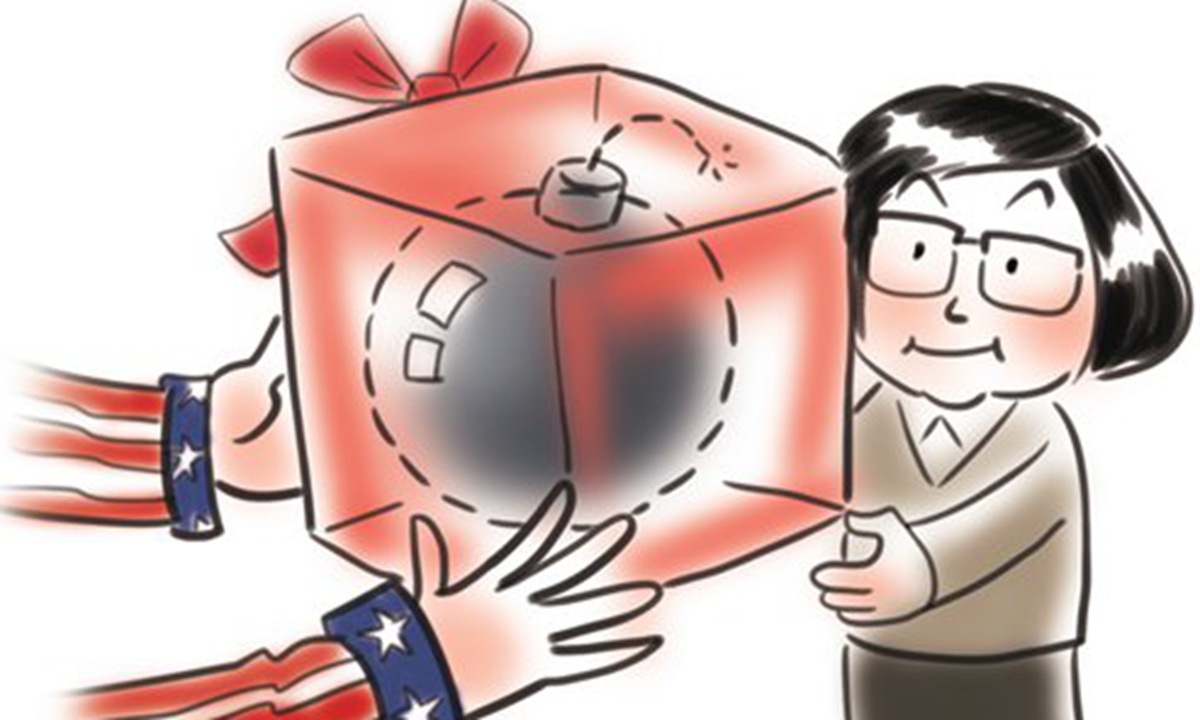US arms sales won't alter power imbalance between mainland and Taiwan
By Song Zhongping Source: Global Times Published: 2020/9/21 22:28:40

Illustration: Liu Rui/GT
The administration of US President Donald Trump is pushing the sale of seven large packages of weapons to the island of Taiwan, according to The New York Times(NYT). The NYT article further said that an air-to-ground missile, the AGM-84H/K SLAM-ER, is the most sensitive weapon system of the proposed packages. The missiles could hit targets on the Chinese mainland or at sea, including warships trying to cross the Taiwan Straits.
In accordance with the three China-US joint communiqués, especially the August 17 Communiqué, the US government stated that it does not seek to carry out a long-term policy of arms sales to Taiwan. It further noted that its arms sales to Taiwan will not exceed, either in qualitative or in quantitative terms, the level of those supplied in recent years since the establishment of diplomatic relations between the US and China in 1979. The Taiwan Relations Act that was enacted in 1979 also stipulates that the US shall provide Taiwan with arms that are only defensive in character.
However, the air-to-ground missile included in the proposed packages of arms sales to Taiwan falls into the category of offensive weapons.
As a matter of fact, Washington has violated the related rules and regulations enacted in its acts and communiqués regarding arms sales to the island of Taiwan for a long time. As early as in 1992, US F-16 warplanes, which the US sold to Taiwan, are also offensive weapons.
What Beijing should consider now is how to counter the US. After all, Washington has repeatedly challenged the one-China principle and trampled the three China-US joint communiqués.
Reuters said that pursuing seven sales at one time is rare. It breaks precedent with US military sales to the island. What are Washington's intensions?
First, US arms dealers could earn a lot of money from such large-scale arms sales. Trump is certainly willing to do so. The arms business has always been one of the ways for the US to make money. They have sold a large amount of second-hand or non-advanced weapons and equipment to Taiwan. As such, US arms dealers can make huge profits from it.
Second, the Trump administration as well as other politicians and lawmakers want to create a cross-Straits arms race to drain China's power.
In addition, the US wants to intensify the cross-Straits tensions to prevent China from growing too fast. Arms sales to the island of Taiwan can certainly achieve that aim. This seriously harms China's development interests and security. It also seeks to contain China.
Whereas the US continues to provoke China, this explicit deal may be approved. However, whatever the island of Taiwan buys, it will not be able to change the power imbalance between the mainland and Taiwan. The fact is that Taiwan's military capabilities are nowhere close to what the PLA can do. That is to say, one or two pieces of weapons can't change the power imbalance.
With the US presidential election approaching, the Taiwan card has been played too far by Washington. Recently, a US under secretary of state visited Taiwan. The US ambassador to the United Nations met with representatives of the island too and supported its participation in UN affairs. Some lawmakers have even suggested that the US should restore "diplomatic" relations with Taiwan.
Trump has frequently played the Taiwan card, trying to win his presidential election without any costs. It is very likely that Trump and his far-right populist constituency will pass on this proposal. Trump may, if reelected, consider establishing "diplomatic" relations with Taiwan. He may further promise to bring Taiwan into the international community. Even if Joe Biden is elected, the situation might be the same.
In the face of this, China should not hold out hope for the US. China must maintain its strategic focus. Besides, China now needs to increase its military and economic strength. It must accumulate comprehensive national strength and be prepared for military conflicts. If the US arms sales to Taiwan are approved, the PLA and the Chinese government should impose sanctions on relevant US companies and normalize these sanctions. All US companies that violate the one-China principle should be blacklisted. This will be a deterrence for these US companies - not only companies that sell weapons, but also some affiliated companies.
The author is a Chinese military expert and commentator. opinion@globaltimes.com.cn
Posted in: VIEWPOINT,CHINA-US